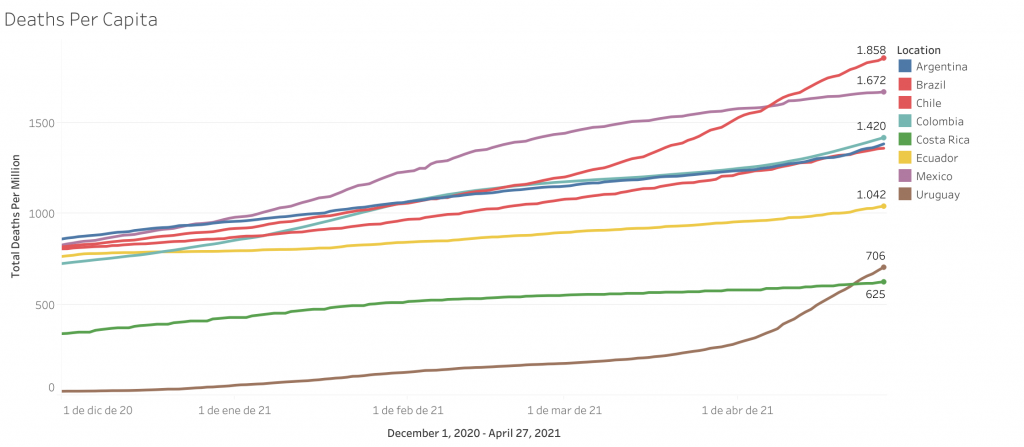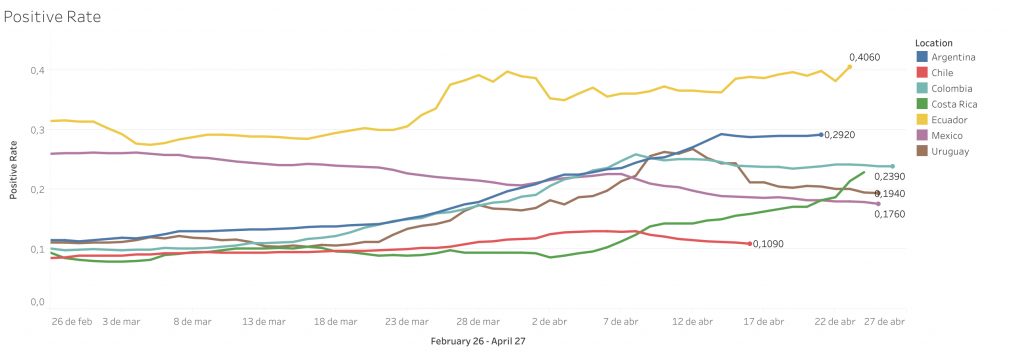What You Should Know
- Vaccine Diplomacy: The United States announced that it will share 60 million doses of the AstraZeneca COVID-19 vaccine, manufactured in Maryland, with other countries.
- US-LAC relations: Adrienne Arsht Latin America Center Director Jason Marczak and Assistant Director Cristina Guevara wrote in the Miami Herald that the US should prioritize Latin America and the Caribbean when allocating vaccine doses to be available for global distribution.
- 10 minutes: A Honduran dies every 10 minutes from COVID-19 according to Honduran the Association of Medics of the Institute of Social Security. Here are this week’s figures.
Health + Innovation
- Argentina: The country has resumed talks with Pfizer to purchase COVID-19 vaccines.
- Spain: At the 27th annual Ibero-American Summit in Andorra, SpanishPrime Minister Pedro Sánchez said Spain will donate between 5 and 10 percent of its vaccines (around 7.5 million doses) to Latin America and the Caribbean.
- Johnson & Johnson: On April 24, several US states resumed use of the Johnson & Johnson COVID-19 vaccine. The vaccine had been suspended for 11 days due to concerns over a rare risk of blood clots.
- Jamaica: On April 26, 55,000 doses of the AstraZeneca COVID-19 vaccine were received through the COVAX facility.
- Counterfeit Vaccines: In response to reports of counterfeit or unauthorized vaccines in the region, PAHO is urging people to get vaccinated only through national immunization programs.
- Barbados: PAHO donated over 60,000 protective supplies – including N95 masks, surgical masks, and gowns – to the Barbados Defense Force.
- Brazil: Anvisa, the country’s health authority, said that it will not recommend importing Russia’s Sputnik V vaccine due to questions on development, safety, and manufacturing. Russia criticized the decision as politically motivated.
Economies in Focus
Multilateral Analysis
- ECLAC estimates that average public debt reached 56 percent of GDP in 2020 due to increased spending to address the COVID-19 pandemic.
- UNDP reported that the pandemic has had the greatest impact on small and medium-sized firms (SMEs) in Latin America, due to their limited capacity to respond to a decrease in sales. The organization highlighted that as much as 99.5 percent of Latin America’s firms are SMEs.
Economic Aid
- Peru authorized workers to withdraw up to 100 percent of funds available to them under the severance fund.
- Chilean President Sebastián Piñera announced that he would present a law allowing workers to make a 10 percent withdrawal from their pension funds for the third time.
Economic Impact
- The Chamber of Commerce in Santiago, Chile, predicts that e-commerce sales could reach $11.6 billion this year in Chile, a 22 percent increase over 2020 figures.
- Grupo Financiero Banorte Director Marcos Ramírez announced that the Mexican economy has begun to recover and estimated that GDP would grow 5.3 percent in 2021.
- The value of Argentina’s bonds on April 26 fell as doubts about the country’s economic future and new COVID-19 infections rose.
Quarantines + Travel Restrictions
Quarantines + reopenings
- On April 27, Paraguay implemented additional restrictions. The new restrictions include a nightly 8:00 p.m. curfew in cities with high COVID-19 prevalence, capacity limits in restaurants, and the suspension of in-person university classes. The measures will remain in effect until May 10.
- Peru eased restrictions to allow for open-air activities including sports and cultural activities, although concerts and fairs are still prohibited. However, Lima is still classified as extreme risk, and there is a stay in-place-order in effect between May 2 and May 9.
- Ecuador issued a decree imposing a nightly curfew from 8:00 p.m. to 5:00 a.m. during the weekends until May 20 in sixteen of the country’s twenty-four provinces.
- Bogotá declared a red alert as ICU occupancy surpassed 90 percent. Mayor Claudia López announced new restrictions and the continuation of four days of eased restrictions and three days of lockdown until May 9.
- Chile lifted the stay-at-home order in Santiago and other municipalities after a month of severe restrictions as daily new cases remained below 7,000 for several consecutive days.
Border and travel restrictions
- Beginning May 1, Grenada will only require travelers who are fully vaccinated to quarantine in their accommodations for up to 48 hours, pending the results of a negative PCR test administered on arrival. Travelers who are not vaccinated must quarantine up to 7 days.
- Despite easing restrictions, Chile will keep borders closed until May 26, prohibiting citizens from engaging in leisure travel and preventing non-residents from entering.
- After suspending international flights in March, the Argentine government has begun to authorize flights beginning May 1.
In Focus: A Plea for Vaccine Donations
- To date, COVAX has delivered 6.90 million vaccine doses to the region with an additional 414,000 in transit. Mexico, Brazil, Colombia, Argentina, and Ecuador have been the principal recipients of the vaccines. The COVAX mechanism will negotiate vaccines on behalf of participating countries for up to 20 percent of member countries’ populations.
- Meanwhile, cases in Central America have continued to spike. Costa Rica’s hospital system is close to collapse, according to Román Macaya President of Costa Rica’s Social Security Fund. Cases are also spiking in Honduras, Guatemala, Trinidad and Tobago, and Cuba. PAHO Director Dr. Clarissa Etienne said that the region had the greatest need for vaccines and called upon developed countries to show solidarity. Less than 1 percent of the Honduran and Guatemalan populations have been vaccinated.
- Many DC-based organizations including the Atlantic Council’s Maria Fernández Bozmoski and Wazim Mowla have called upon the Biden administration to donate vaccines to Central American and Caribbean nations, especially as hurricane season approaches. The Biden administration has promised to share 60 million AstraZeneca vaccines, although the administration has yet to announce recipient countries.
By the numbers
- Vaccinations per capita (vaccines administered per 100 people): Chile (76) #5 worldwide, Uruguay (49) #15 worldwide, Dominica (32) #22 worldwide, Antigua and Barbuds (31) #32 worldwide, Barbados (26) #48 worldwide, Saint Kitts and Nevis (22) #52 worldwide, Argentina (16) #58 worldwide, Dominican Republic (16) #59 worldwide, Costa Rica (16) #60 worldwide, Panama (15) #61 worldwide, Source: nytimes.com
- Deaths per capita (deaths per million people): Brazil (1,849) #3 worldwide, Argentina (1,375) #11 worldwide, Colombia (1,407) #12 worldwide, Mexico (1,658) #15 worldwide, Peru (1,812) #17 worldwide, Chile (1,354) #23 worldwide, Ecuador (1,034) #46 worldwide, Panama (1,422) #47 worldwide, Bolivia (1,092) #56 worldwide, Paraguay (846) #58 worldwide, Source: worldometers.info
Quick take


